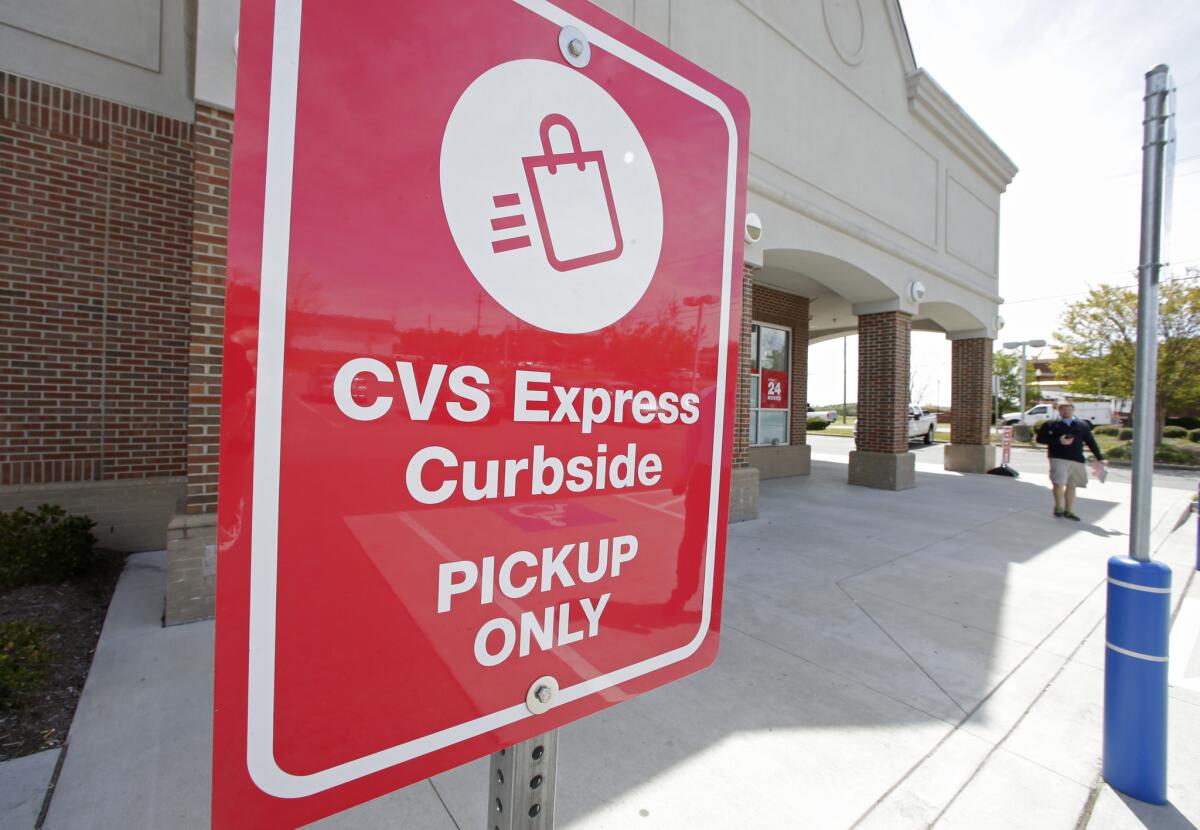Drugstore chain CVS pushes convenience with curbside pickups

A CVS Express parking sign at a CVS store in Harrisburg, N.C.
- Share via
CVS Health will spread its curbside pickup service to drugstores nationwide this year, as traditional retailers continue to hone their reputations for convenience and fight fierce competition online.
The nation’s second largest drugstore chain has partnered with the Palo Alto, Calif.-based technology firm Curbside Inc. to create CVS Express, a program that lets shoppers buy products with an app and then pick them up about an hour later at a nearby store, where an employee will deliver them to the car.
CVS Health Corp. launched the free curbside pickup service in December at a dozen stores in San Francisco and has since expanded it to Atlanta and Charlotte, N.C. The company offers curbside pickup services at 361 stores but has room to grow with more 7,900 retail locations nationwide. It expects to roll out the program in a majority of those stores nationally by year end.
SIGN UP for the free California Inc. business newsletter >>
The CVS partnership with Curbside marks an extension of a trend that began a few years ago with other retailers. Target, Wal-Mart and several grocery chains also have developed curbside pickup programs.
These companies are blending the edge in convenience that they gain from having many locations with online shopping to compete better with the likes of online retailers like Amazon.com, which is expanding a grocery delivery service in several markets. By converting their own stores into pickup locations, retailers avoid the extra costs of packing and shipping, and they can offer more flexibility for time-starved shoppers.
CVS and its major competitors Walgreens and Rite Aid all run thousands of stores with prescription drive-thrus. But CVS is the only one offering a curbside service for items purchased outside the pharmacy.
It developed CVS Express, which cannot be used for prescriptions, after testing a program in which the customer bought online and then had to enter the store to pick up the products. That wasn’t as compelling for customers, said Executive Vice President Helena Foulkes.
“We knew we could help the people who are in a rush, or with children or are just sick and can’t get out of their car for whatever reason, so we felt like this was a bigger innovation for the consumer,” Foulkes said.
After placing an order, the CVS customer will receive a text or email when it is ready. The app then notifies the store when the customer arrives to pick it up.
Wal-Mart Stores Inc., the nation’s largest food retailer, announced last week it was adding eight new markets to its free curbside grocery pickup including Austin, Texas, and Charleston, S.C. Wal-Mart operates more than 4,500 namesake stores in the U.S. By the end of April, it will offer the service in roughly 200 stores in 30 markets.
Wal-Mart says 90% of its curbside customers are repeat users. One of the most popular times for customers to order groceries online is between 8 and 9 p.m., or after many parents have put their children to bed. The company said it also sees a “healthy” number of orders in the middle of the night.
See more of our top stories on Facebook >>
“I absolutely love that we’re able to offer convenience and blend into our customers’ lives when they need us most,” Chief Executive Doug McMillon told investors in a prerecorded transcript in February.
Target Corp., based in Minneapolis, has also teamed up with Curbside and is testing the service in five markets that cover 122 stores, says Eddie Baeb, a company spokesman. Those markets include Chicago, Philadelphia, the San Francisco Bay area, Los Angeles and the New York and New Jersey metro area.
These moves come as Amazon.com is expanding its Amazon Fresh grocery delivery service in markets such as Seattle, Brooklyn, Los Angeles and San Francisco.
Sears Holdings Corp., which operates stores under Sears and Kmart names, was one of the first to roll out the curbside service a few years ago. In 2014, it expanded the service to all 704 Sears stores. It also offers it at more than 100 Kmart locations.
These curbside services are still experimental for retailers and could be scaled back if they don’t yield a profit or eventually break even, said Sucharita Mulpuru, a retail analyst for Forrester.
Even CVS Health said it hasn’t figured out yet how it will make money by offering the service. Foulkes said the company hopes CVS Express will pay for itself by increasing the number of store visits.
Mulpuru said that retailers have to invest in concepts like curbside services that may dilute profitability but could help them keep their market share over the long term, as Amazon and other competitors vie for their business.
“The competitive landscape is so wicked in retail, and there are so many other places a shopper could buy, we can’t force our customers to do anything they don’t want to do,” she said.
Like get out of the car, for instance.
ALSO
Why sporting goods retailers are fumbling
With Tesla 3, German automakers are now seeing Tesla as a threat
Amazon opens Prime Video to monthly memberships in a challenge to Netflix
More to Read
Inside the business of entertainment
The Wide Shot brings you news, analysis and insights on everything from streaming wars to production — and what it all means for the future.
You may occasionally receive promotional content from the Los Angeles Times.









